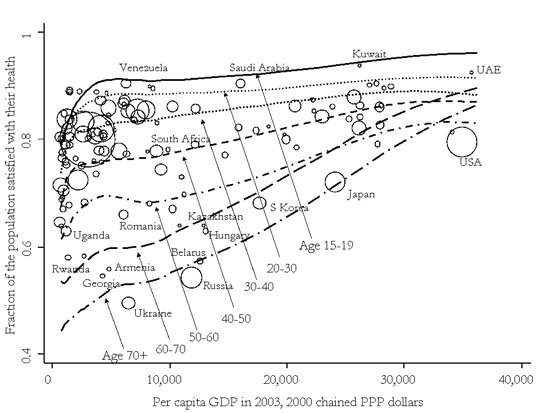PRINCETON, NJ -- How is health satisfaction related to age and income? Gallup Poll data from 130 countries indicate that it depends on where we live and the expectations we hold.

In the graph, countries are plotted as circles, with diameters proportional to their populations. The horizontal axis represents the countries' average income level (GDP per capita in 2003), and the vertical axis represents the percentage of residents in each country who say they are satisfied with their health. The curved lines show average health satisfaction plotted against average national income for seven different age groups.
All the lines trend upward to the right, which means people are more likely to be satisfied with their health in higher-income countries. As you'd expect, on the whole, younger people are more likely to be satisfied with their health at all income levels; the lines range from ages 15 to 19 at the top of the graph to the lowermost line representing people 70 and older.
The graph also indicates that the rate at which health satisfaction deteriorates with age is greater in low- and middle-income countries than in high-income countries -- thus, the gaps between the age lines are larger to the left of the graph (among low-income countries) than they are to the right (among high-income countries). In other words, higher incomes seem to provide some protection against the effects of aging on self-perceived health satisfaction.
In Which Country Is Health Satisfaction Lowest?
The countries of Eastern Europe and the former Soviet Union report extraordinarily low levels of health satisfaction; in fact, these countries represent 11 of the 20 lowest countries in the world. More understandably, other low-ranking countries in health satisfaction include such high-mortality countries as Haiti, Rwanda, Uganda, Burundi, Cambodia, and Chad. In all of these countries, the fraction of people reporting themselves satisfied with their health is between one-half and two-thirds. However, there are other countries hit hard by the HIV/AIDS epidemic where health satisfaction scores are relatively high. These include Tanzania (71% satisfied), Zimbabwe (75%), Botswana and South Africa (both 78%), and Kenya (82%).
Variations in Health Satisfaction
Greater health satisfaction among the world's richer and younger residents is to be expected. However, compared to ratings of overall life satisfaction (see "Worldwide, Residents of Richer Nations More Satisfied" in Related Items), average health satisfaction levels across countries don't seem to track as consistently with some overall global standard. In other words, local or personal expectations may have a bigger impact on health perceptions.
For example, in global comparisons, a nation's average level of health satisfaction is not related to one of the best measures of population health, average life expectancy. The extraordinarily low health satisfaction ratings for Eastern Europe and the countries of the former Soviet Union are a testament not to their poor population health, but to a decline in health among a population that was used to a more reliable healthcare infrastructure prior to the collapse of the USSR.
Earlier reports have found that self-reported health measures are often better in places where people are sicker, and presumably more used to being sick. That frame-of-reference idea may help explain why countries with high rates of HIV prevalence, particularly in Africa, do not systematically report poorer health satisfaction.
Finally, the data also suggest expectations shift as we age. In the high-income countries, it is people in their 50s, not in their 60s or 70s, who report the least satisfaction with their health. Clearly, the health of people in their 50s is better than that of their elders, but this is an age when people experience serious health problems for the first time; perhaps it is not poor health that is hard to bear, but the first signs of mortality.
Angus Deaton is a Gallup Senior Scientist, as well as the Dwight D. Eisenhower Professor of International Affairs at the Woodrow Wilson School of Public and International Affairs and Professor of Economics and International Affairs, both at Princeton University.
